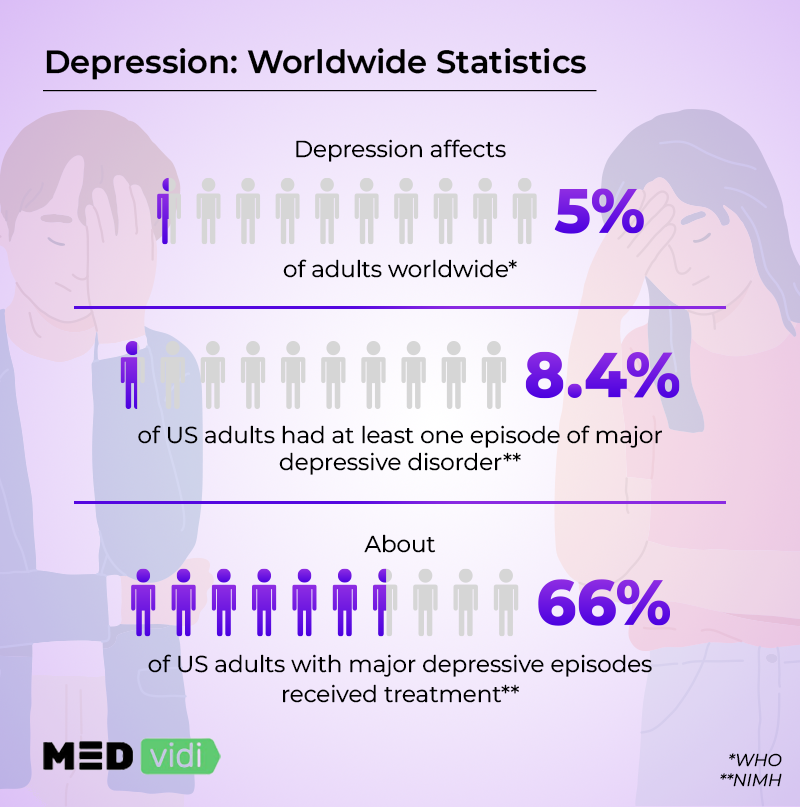Depression is a mental illness that affects every part of a person’s life. There is no single 100% definitive test for depression, so it is especially important to turn to a professional if you suspect having any form of this disorder. Mental health providers will use different techniques to evaluate your mental state and will support you throughout your recovery.
This article describes what symptoms should be taken as warning signs and the diagnosis of depression.
Diagnosis Criteria for Depressive Disorders
There are different types of depression an individual can be diagnosed with. According to the DSM-5 (Diagnostic and Statistical Manual of Mental Disorders issued by the American Psychiatric Association), they can be the following:
| Diagnosis | Description | Symptoms |
|---|---|---|
| Major depressive disorder (MDD) | A major depressive disorder diagnosis is based on the presence of at least five symptoms that last at least two weeks, most of the day every day. One of the symptoms present should be a depressed mood or loss of interest in daily activities. |
|
| Postpartum (peripartum) depression | Postpartum (peripartum) depression occurs during pregnancy or in the first weeks after delivery (sometimes up to a year following delivery). |
|
| Persistent depressive disorder (Dysthymia) | Depressed mood for most of the days that last at least 2 years, along with the presence of any two symptoms. |
|
| Premenstrual dysphoric disorder (PMDD) | PMDD takes place repeatedly during the premenstrual phase of the cycle and eliminates around the time of (or after) menses. Five of the symptoms must be present to diagnose PMDD. |
|
| Substance/Medication-induced depressive disorder | When a substance (drugs, prescription medicine, or alcohol) induces depressed symptoms while being used or a withdrawal syndrome following consumption, the condition is called substance/medication-induced depressive disorder. The drug or substance needs to be known as capable of causing the symptoms. |
|
| Depressive disorder due to another medical condition | Individuals have symptoms of clinical MDD as a direct consequence of another underlying medical condition determined by medical history, physical examination, or lab reports. |
|
How is Depression Diagnosed?

Self-Tests for Identifying Depression:
- Beck Depression Inventory (BDI). It was developed by Aaron T. Beck to determine whether an individual has depression and its severity (mild, moderate, and severe). The test assesses your state during the last two weeks.
- Center for Epidemiologic Studies Depression (CES-D). 20 self-report points in this scale assess the main elements of depression experienced throughout the previous week.
EQ-5D[1] . It is a standardized, non-disease-specific tool for characterizing and assessing health-related quality of life. The test evaluates five aspects of quality of life: self-care, mobility, pain or discomfort, regular activities, and anxiety or depressive symptoms.Hamilton Depression Rating Scale (HAM-D)[2] . It is a widely used clinician-administered scale that assesses Individuals’ symptoms of depression before, during, and after depression treatment.- Montgomery-Åsberg Depression Rating Scale (MADRS). The Hamilton Depression Rating Scale was modified to create this scale. It evaluates the severity of depression and is more responsive to changes over time.
- Beck Hopelessness Scale (BHS). BHS is a self-report tool that evaluates someone’s unfavorable predictions for the future. Participants can select “true” or “false” as their answer in 20 points.
- Quick Inventory of Depressive Symptomatology-Self-Report (QIDS-SR). It examines the mood and behavior from the previous week to evaluate depressive symptoms.
- Patient Health Questionnaire (PHQ-9). A self-report tool is used to identify depression symptoms over the last 2 weeks.
- Geriatric Depression Scale (GDS). It was created to identify and assess depression in older individuals and is beneficial for those with cognitive impairments. The questions cover how a person has felt over a specific period of time.
- SmartCare Symptoms Checker. It is a science-backed screening tool that has clinically tested questions. It can help you evaluate your symptoms and show whether professional help is needed. If you book an online appointment with a doctor, they will check your symptoms before your online visit.
The results of self-assessments can only be used for informational purposes. Please consult a professional to get a diagnosis.
Professional Assessment and Diagnosis
Only a mental health professional is qualified to diagnose depression based on the psychiatric assessment. It includes the following:
- DSM-5 guidelines. The doctor will use the Diagnostic and Statistical Manual of Mental Disorders to determine if you meet the criteria for a diagnosis of depression.
- Medical history. Your doctor needs to know what other medical conditions you might have, what kind of medication you are on, what medication you used to take, your family history, and so on.
- External factors that are known to cause depression. Some stressful events, personality features, illnesses, and other factors may majorly impact you and cause depression.
Your doctor will enquire about your symptoms, thinking patterns, behavior, and feelings. To assist in addressing the inquiries, you might be requested to complete various tests and questionnaires.
Conclusion
Stop dealing with depression-related symptoms on your own and get the help and care you deserve. Top specialists at MEDvidi—an online mental health clinic—are here to help.
Book an online visit and get your symptoms evaluated during an online call. After the assessment, you may get a clinical depression diagnosis. In this case, you will also receive a personalized treatment plan and an online prescription for the most suitable medication.












